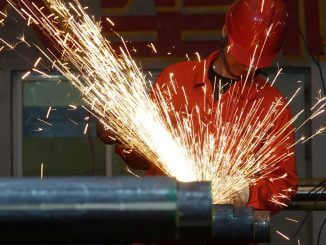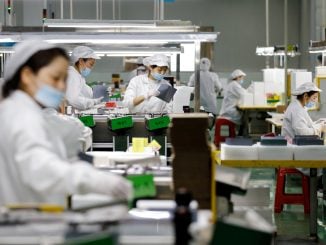RALEIGH — White House trade and manufacturing adviser Peter Navarro said he used to visit the High Point Furniture Market when he managed a furniture company in Cambridge, Mass. while earning his PhD in economics at Harvard University.
“To pay my way through I managed a small furniture company in Cambridge, Mass. and for a couple years I went to High Point to buy chairs. And I watched over time as that industry and the local North Carolina craftsmen were driven out of the market by the Chinese,” Navarro said in an interview with North State Journal.
Navarro, who is one of President Donald Trump’s top economic advisers, said that North Carolina “in many ways was at the front lines of globalization and was one of the first states in the union to suffer the most in textiles and furniture,” a crisis that soon spread to other industries across the country, such as automobiles and electronics.
According to Navarro, North Carolina is now playing an important role in President Trump’s four-vector strategy to fight what he called the “China virus,” the novel coronavirus. The strategy focuses on vaccine development, therapeutics, testing, and personal protective equipment. Navarro said he has been especially focused on PPE.
“I personally have been very active working with the textile alliance and companies such as HanesBrands, Parkdale Mills, and Beverly Knits. Through Defense Production Act Title III and the CARES Act, there’s been tens of millions of dollars and some cases hundreds of millions that will benefit the state,” Navarro said.
He mentioned some of the large contracts awarded to companies producing PPE in the state, such as HanesBrands, who received $322 million to produce 450 million gowns and cloth face coverings, and Parkdale Mills, who received a contract worth $532 million for 60 million reusable isolation gowns.
A report from the Charlotte Business Journal said that North Carolina ranked eighth in the nation in terms of value for COVID-19 emergency materials.
“Economic security is national security. Even as we fight to fend ourselves from the CCP virus [COVID-19], we are creating jobs and rejuvenating part of the textile industry in North Carolina, which, by the way, originally got hammered by deals Joe Biden voted for, including NAFTA, and China’s entry in the World Trade Organization,” said Navarro. “What we’re trying to do in supply chain is bring that back on shore, and if we’ve learning anything in this crisis, we’re dependent on China and India and other places, and President Trump is working on that.”
Navarro has also been out front on the Trump administration’s trade issues with China. He said that President Trump is the first president to stand up to the Chinese Communist Party since Richard Nixon opened relations with the country.
“We know that China only responds to toughness,” Navarro said when asked about the outlook between the two countries.
He contrasted the Trump administration’s stances with those of Biden, pointedly saying that Biden voted as a senator to allow China to join the WTO, and that on his watch as vice president, along with President Barack Obama, a state-owned Chinese company purchased factories in states like Michigan.
A New York Times investigation found that the company, Henniges Automotive, is a subsidiary of Aviation Industry Corporation of China.
Another important area of concern for Navarro is the Strategic National Stockpile, which he said was “threadbare” after the Obama administration. Navarro said that Biden’s experience in the administration’s response to H1N1 should have been a wake-up call.
“Biden’s chief of staff said that they did everything wrong, and only by the grace of God it didn’t become one of the worst mass casualty events in history,” Navarro said. “Coming out of that crisis, they allowed N-95 mask production to go to China and Mexico, and the stockpile was not kept up like it should have been.”
Navarro said he has weekly meetings to create a Strategic National Stockpile 2.0 “smart stockpile” to make the stockpile bigger, add capacity and ensure that by the end of September it can handle a virus surge in the fall and winter months.
When asked to comment on statements from a doctor who said that the virus originated from a Chinese lab, Navarro said that COVID-19 “appears weaponized.”
Dr. Li-Meng Yan’s statements made worldwide news when she appeared on Tucker Carlson Tonight on Sept. 15.
“I think it’s an important question to ask — where did this thing come from,” Navarro said. “Whether it was weaponized by nature or by the CCP, it’s an open question. It acts this way for three reasons: it has a large amount of asymptomatic spread; it appears to be relatively impervious to heat and humidity, you know we thought it would go away in the summer and it didn’t; and the third, it seems to target specific populations.”
Navarro said that when a virus is “spawned in China and appears within a mile of two biological labs, Occam’s Razor tells you the likely explanation is that it came from the lab. China needs to come clean on all of that, and they haven’t — but they need to.”



